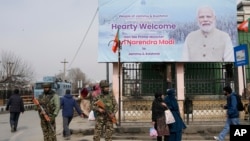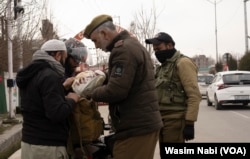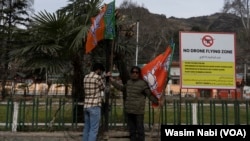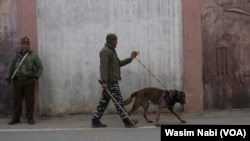Authorities on the Indian side of Kashmir are on high alert ahead of a scheduled visit to the region by Indian Prime Minister Narendra Modi on Thursday, March 7. This will be Modi’s first visit since his government stripped the disputed area of its special status as a semiautonomous region in 2019. Kashmir is India’s only Muslim majority region.
Thousands of troopers, including local police and paramilitary forces, have been deployed in Srinagar, the capital. Fences installed by the Jammu and Kashmir, or J&K, government and flags of Modi’s Bharatiya Janata Party, or BJP, will welcome him at Bakshi Stadium in the Wazir-Bagh neighborhood where he is scheduled to address the public.
Security forces deployed around Srinagar have taken other security measures ahead of the visit, including frisking commuters, which has offended some residents, and using sniffer dogs in the search for banned substances.
“Frisking is a form of harassment, and we Kashmiris have been subjected to it for decades. I believe nothing has changed in Kashmir; rather, the situation has in fact worsened,” said Jahangir Khan, a resident of Srinagar.
“The slogan of the security forces, ‘Respects all and suspects all,’ is full of hypocrisy. How can you respect everyone if you suspect everyone?” he said, adding that in recent days, most residents have preferred to stay at home.
Modi, according to a statement issued from his office through the Press Information Bureau, will participate in a program titled “Developed India — Developed Jammu Kashmir.”
During the program, the prime minister is expected to "dedicate" an agriculture development program worth more than $600 million “for boosting agri-economy in J&K,” a press statement read. He will also “launch multiple projects related to the tourism sector,” the statement added.
The BJP sees Modi’s visit to Kashmir as a move to gain support for a third consecutive term in power with nationwide elections scheduled for April. Politicians associated with the J&K branch of the BJP contend that more than 200,000 people from Kashmir are expected to be on hand for the prime minister's arrival at Bakshi Stadium.
Modi "has written the new chapter of development in J&K by opening the gates of treasure of India for the people of the region,” Ravinder Raina, the J&K’s BJP president, told reporters on Tuesday. “His visit on March 7th will be remembered as a historic event.”
Raina added that people of the Himalayan territory “admire” Modi and that is why they will visit the capital from various parts of the valley in large numbers to “catch his glimpse.”
“The stadium does not have the capacity to accommodate 200,000 people, therefore arrangements are made at several locations in Srinagar so that everyone can see and hear him on big screens,” Raina said. “Every household in Kashmir appreciates Prime Minister Modi’s effort he took for the betterment of people of J&K.”
Some locals said they didn't expect the Modi visit to produce benefits, in part because of the region’s loss of its special status.
“People were robbed of their rights on 5 August, 2019. The special status was never an obstacle to develop the region. No one expects anything from Modi and his government,” said Mohammad Ayaz, another resident of Srinagar. “People have a clear picture in front of them. People here know who is working for their betterment and who is misleading them.”
The “unemployment rate in J&K has surged to an all-time high,” Ayaz told VOA. “BJP can try everything to win seats, but they won’t succeed either in Kashmir, Jammu or in Ladakh.”
Kashmir’s loss of its special status led to the division of the region into two federal territories – Jammu and Kashmir, and Ladakh. Both areas are ruled by the central government and have no legislatures of their own.
On March 4, The Hindu, a newspaper in New Delhi, reported that the J&K administration was mobilizing thousands of government employees to attend Modi’s rally. The report said that 13 government departments had been told to send their employees to Bakshi Stadium.
“Yes, this is true. Many government employees, including those from the J&K Bank, have been instructed to visit the venue at 5:30 a.m.,” a government employee told VOA on the condition of anonymity because of the sensitivity of the subject.
“The administration is not only compelling government employees but also private schools by asking them to send their vehicles to ferry employees to the stadium,” he added.
“Everyone has to abide or else he or she will face the consequences,” the employee said. “No unknown person would be allowed to enter the venue, as the government has prepared the list of individuals after security agencies cleared their names following a proper verification.”
Many residents of Srinagar said their family members had been detained by local police in the lead-up to Modi’s visit.
“My friend has been detained because of his past,” a resident of the Soura neighborhood of Srinagar told VOA. “He will be released after Modi travels back to Delhi.”
Vidhi Kumar Birdi, inspector general of the Kashmir police, was approached for his comments. He disconnected the call as soon as he was questioned.
India and Pakistan have both claimed Kashmir since the two countries gained independence from Britain in 1947. They administer parts of the region with a “Line of Control” as the de facto border.
Wasim Nabi and Ayesha Tanzeem contributed to this report. Some information came from the Associated Press.







